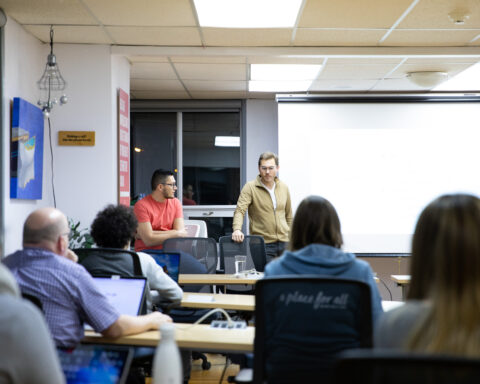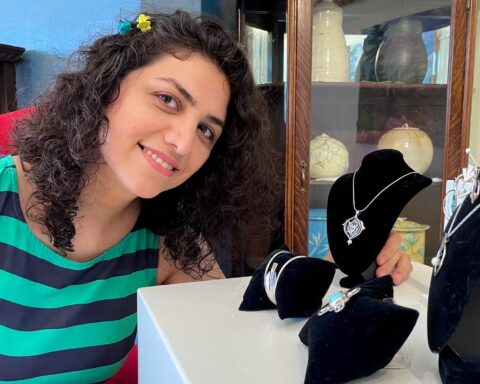Diplomacy smiles, declared a Tehran newspaper last Friday, hours after Iranian state television broadcasted the speech of the American president live for the first time in Iran’s revolutionary history. Car horns honked, people stood atop their sunroofs and waved Iranian flags, and text messages thanking Iranian foreign minister Javad Zarif flooded social media and Viber, one of the most popular instant messaging apps in Iran. The details of a framework nuclear accord between the U.S. and Iran had been confirmed, and people across Iran – and the world – seemed jubilant.
In Canada, messages of joy were also shared among the Iranian community. Sauber Mojtahedy, an Iranian-Canadian optician, chuckles as he recalls greeting the local Imam at a Pickering, Ontario mosque last week. “I went to congratulate the Imam (who is Pakistani) after the prayer and he said, ‘I have to say congratulations to you!’”
“As a kid growing up in Iran the very first thing I learnt about America was how to make the U.S. flag so we could either set it on fire or step on it as we walked from the school yard to the classrooms.” – Hannah Tabatabae
“It’s great for the world and for Iran because the sanctions have badly affected businesses and the economy,” says Mojtahedy.
 Hannah Tabatabae (pictured left), a 29-year-old Iranian-Canadian working towards becoming an architect, was also excited about the development. “I was very hopeful but didn’t see it coming so fast,” she says. “I was surprised even when they decided to sit at a table to negotiate in the first place because for many, many years, the Islamic Republic of Iran’s politics were against any sort of talk or negotiations with the West. Things were in the wrong direction for many years.”
Hannah Tabatabae (pictured left), a 29-year-old Iranian-Canadian working towards becoming an architect, was also excited about the development. “I was very hopeful but didn’t see it coming so fast,” she says. “I was surprised even when they decided to sit at a table to negotiate in the first place because for many, many years, the Islamic Republic of Iran’s politics were against any sort of talk or negotiations with the West. Things were in the wrong direction for many years.”
Tabatabae immigrated to Toronto eight years ago, after completing her architecture degree from Azad University in Tehran. Her memories growing up in Iran in the first decade after the revolution, where hostility between the two countries was at its peak, left a lasting imprint. “As a kid growing up in Iran the very first thing I learnt about America was how to make the U.S. flag so we could either set it on fire or step on it as we walked from the school yard to the classrooms. I was seven years old and had no idea why were doing this or what it meant.
“Meanwhile, I also thought America had lots of tasty chocolate and other amazing things, as my aunt would bring me things from there. So I had mixed feelings about it. But then I travelled there when I was a teenager and everything has changed in my mind since then.”
“Harper has cut relations with Iran. He has isolated Canada from the world because he favours policy that is favourable to Israel, but not to Canada.” – Sauber Mojtahedy
The nuclear deal is a step in the right direction, Tabatabae says. And if relations continued to improve between Tehran and Washington, she would even contemplate re-locating. “I would definitely consider moving back to Iran – not because things are already better, [but] because at least we are in the correct direction. [Iranian] President Rouhani was not the ideal candidate, but we have to work with what we have and make the best out of it.”
Iran-Canada Ties
For Mojtahedy, the nuclear accord is not so much as a step forward in terms of political reform, as it is recognition that Iran is a powerful regional player committed to peace. “Iran is not interested in creating a nuclear bomb,” he says, quoting a religious edict issued by Iran’s Supreme Leader Ayatollah Ali Khamenei forbidding the production and use of a nuclear bomb. “It only wants to produce nuclear energy for domestic use, like Canada does – for running power plants, electricity and other nuclear technology.”
Like the U.S., the Canadian government has also held estranged ties with the government in Iran since Ayatollah Khomeini overthrew the Pahlavi dynasty in 1979. Diplomatic ties worsened still in 2012 when Foreign Minister John Baird listed Iran as a state sponsor of terrorism and expelled its diplomats from Canada, a move that angered many Iranian-Canadians – and thrilled Canada’s close ally, Israel.
“Harper has cut relations with Iran. He has isolated Canada from the world because he favours policy that is favourable to Israel, but not to Canada,” Mojtahedy argues, citing Canada’s support for Israel even during the country’s attack on Gaza last summer. “It’s undemocratic. As Muslims, we believe in moderation. All the [terrorist-related] problems in the world exist because of extremism – from Al Qaeda, from Islamic State and from Israel in their treatment towards the Palestinians.
“If you want to have real peace in the world, we need to oppose extremism and support peace and moderation,” he adds.
‘Nothing has Changed’
Not everyone feels the winds of change in Tehran and Washington though. An Iranian-Canadian businessman (who did not want to disclose his name), who founded a company in Toronto 20 years ago, after working under both the Shah and Khomeini, says nothing has really changed.
“Rouhani, Ahmadinijad (Rouhani’s predecessor), they are all puppets in a harsh religious regime – a regime with only one man in power.”
“Most people in Iran have been living under pressure of sanctions and religious laws so they easily get excited over any sign of relief.” – Iranian-Canadian
He points to the deep mistrust held by both countries since Iran’s revolution. “The way the United States and the West treated Iran and its allies in the Middle East has left no room for the Iranian regime to seek a better or long-lasting relationship with them,” he says.
“Iran also understands that Russia and China have a better history of supporting their allies. Take a look at [Syrian president] Bashar al-Assad, who is still in power after three and a half years of domestic war in Syria, even after Hillary Clinton said ‘Assad’s days are numbered,’ three years ago. Most people in Iran have been living under pressure of sanctions and religious laws so they easily get excited over any sign of relief.”
People in Iran are being “bombarded” with news of victory by government-controlled media. When they find out that nothing is going to change, depression will ensue, he adds.
Despite the skeptics, others say those small signs of relief are a sure sign of a better future. “There are always reasons to be sad, but throughout years of isolation and sanctions, we learned to enjoy and celebrate the smallest sparkles of hope,” says Tabatabai. She quotes the great Persian poet Omar Khayyam: “Be happy for this moment. This moment is your life.”





